Thursday’s historic debate among 13 candidates for the 12-member Greenwich Board of Estimate and Taxation – 6 Democrats, 6 Republicans and 1 Independent – was essentially a showdown over which party deserves to control the board in the next term.
The party with the most votes automatically gets the board chairmanship, and for most of a century, that has been a Republican.
Why is that important? The chair gets a tie-breaking vote, effectively a 7th vote, that candidates from both parties acknowledged has been used with unprecedented frequency in recent years.
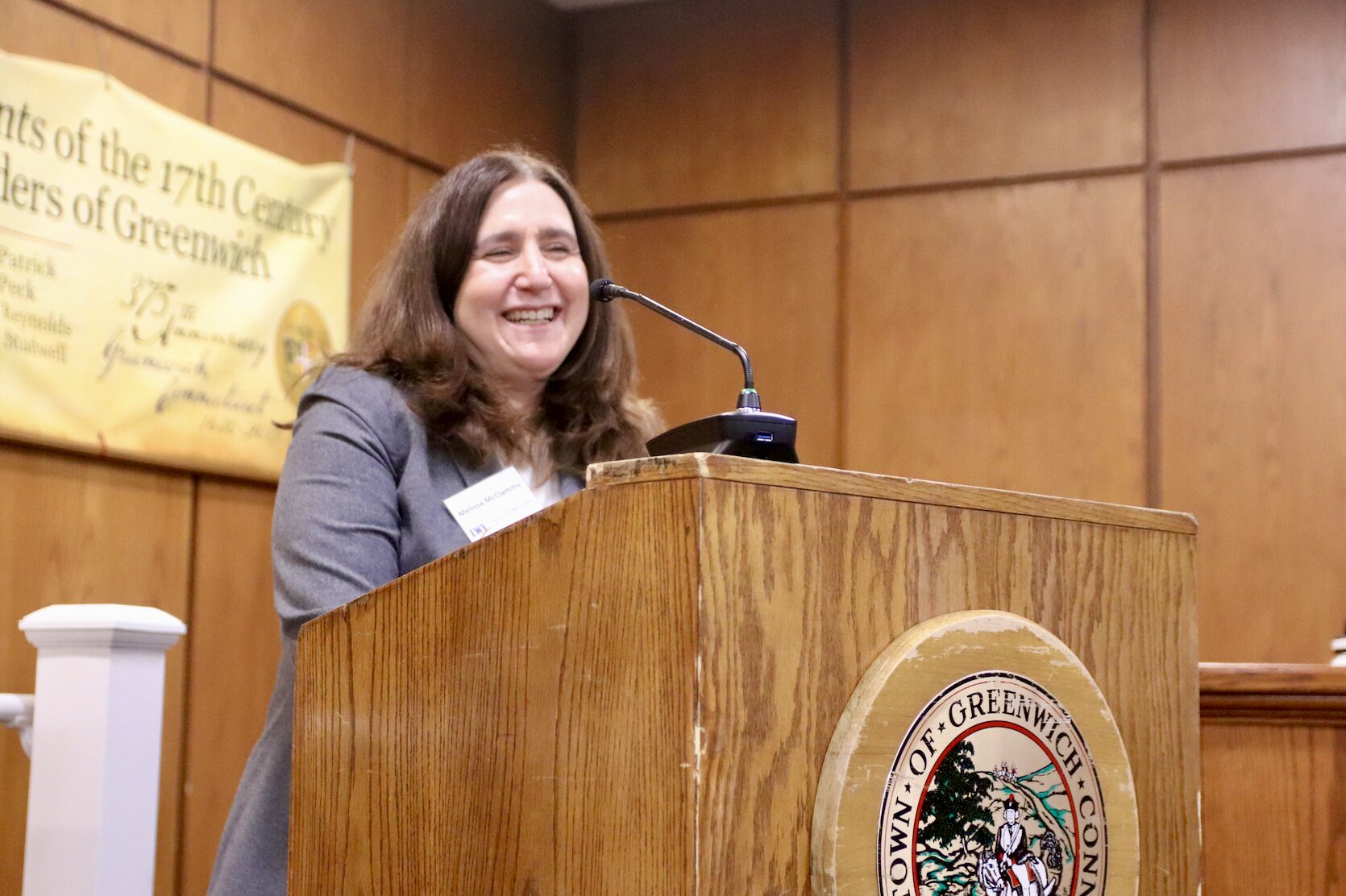
Melissa McClammy, president of the League of Women Voters of Greenwich welcomed attendees to the BET debate. Oct 9, 2025 Photo: Leslie Yager
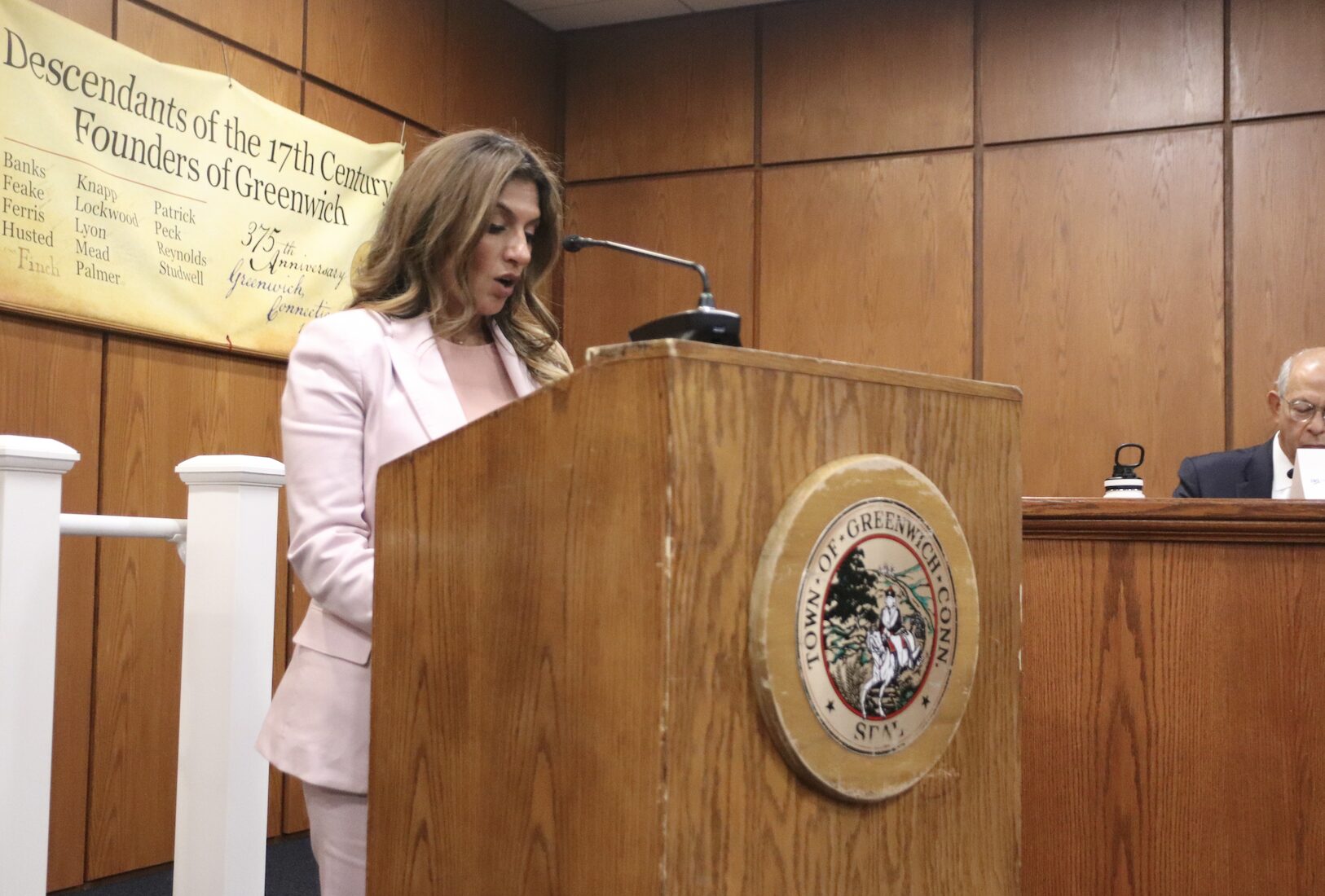
The BET debate among 13 candidates was moderated by Hena Doba on Oct 9, 2025 Photo: Leslie Yager
The debate was organized by the League of Women voters of Greenwich and moderated by Hena Doba with assistance from GHS student Catherine Broderick.
In addition to six candidates from each party, an Independent candidate, Karen Fassuliotis, an incumbent Republican who was passed over for endorsement by her party, was the 13th candidate.
Only two Republicans – current BET chair Harry Fisher and 20-year member Leslie Tarkington – are incumbents running for re-election.
Tarkington, who was passed over by her party, then petitioned to earn a spot on the ballot, was included on a slate with chair Harry Fisher and 4 new Republican BET candidates – Joe Kelly, Joe Pellegrino, Sally Bednar and Josh Brown – who called themselves the “Better BET” in a September primary election where all six were the top vote-getters. Mr. Pellegrino previously served on the BET from 2009 to 2013, and chaired its Budget Committee for two years.
They defeated a slate that included three Republicans who were also passed voter by their party: Nisha Arora, Lucia Jansen and David Alfano.
The Democratic candidates include incumbent and four-term member David Weisbrod, incumbent Elliot Alchek, incumbent Stephen Selbst, incumbent Matt DesChamps and Laura Erickson who served on the BET for two terms, plus newcomer Doug Fenton, a former hedge fund partner.
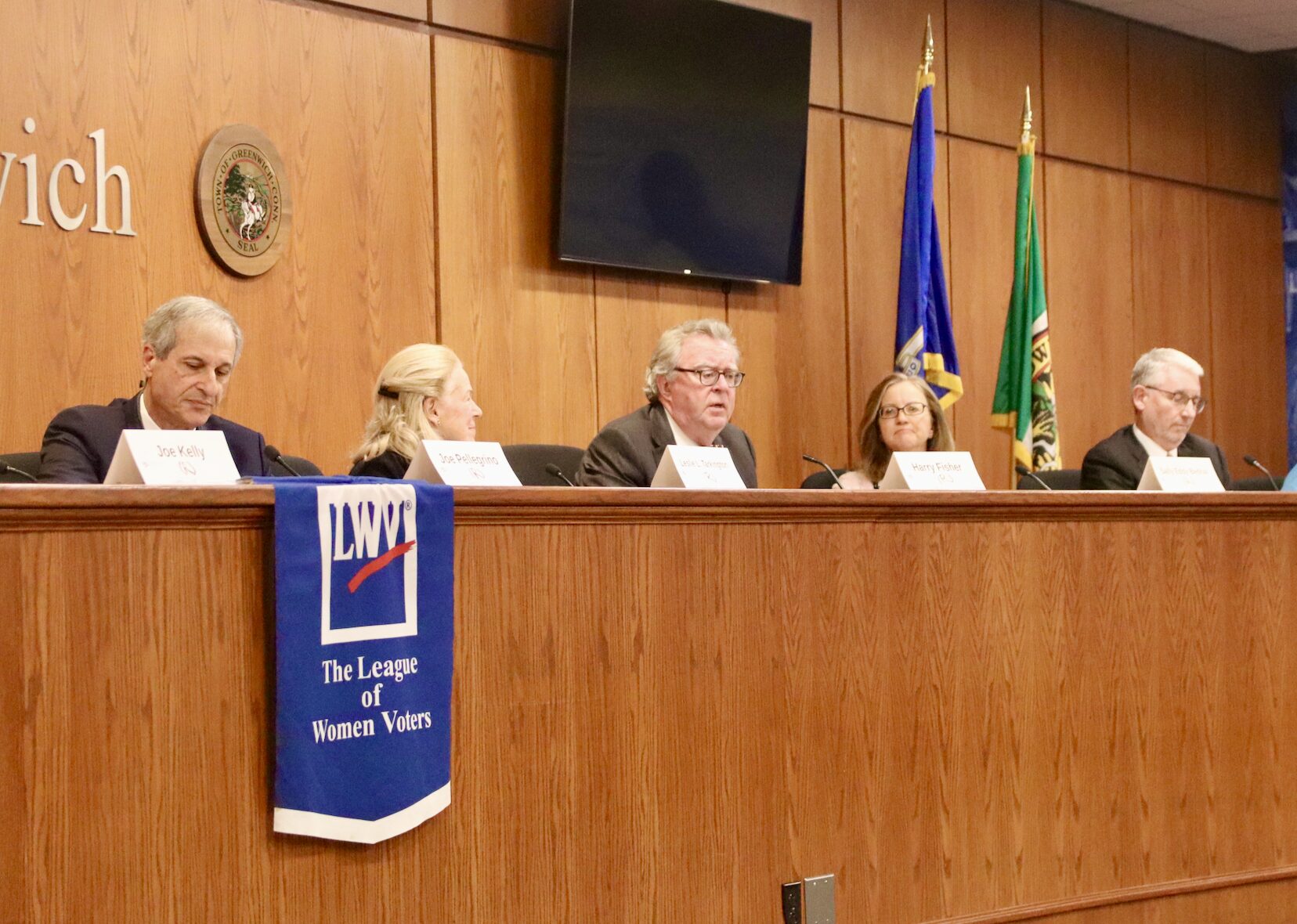
Republican candidates Joe Pellegrino, Leslie Tarkington, Harry Fisher, Sally Bednar and Josh Brown during the Oct 9 BET candidate debate hosted by the League of Women Voters Greenwich. Photo: Leslie Yager
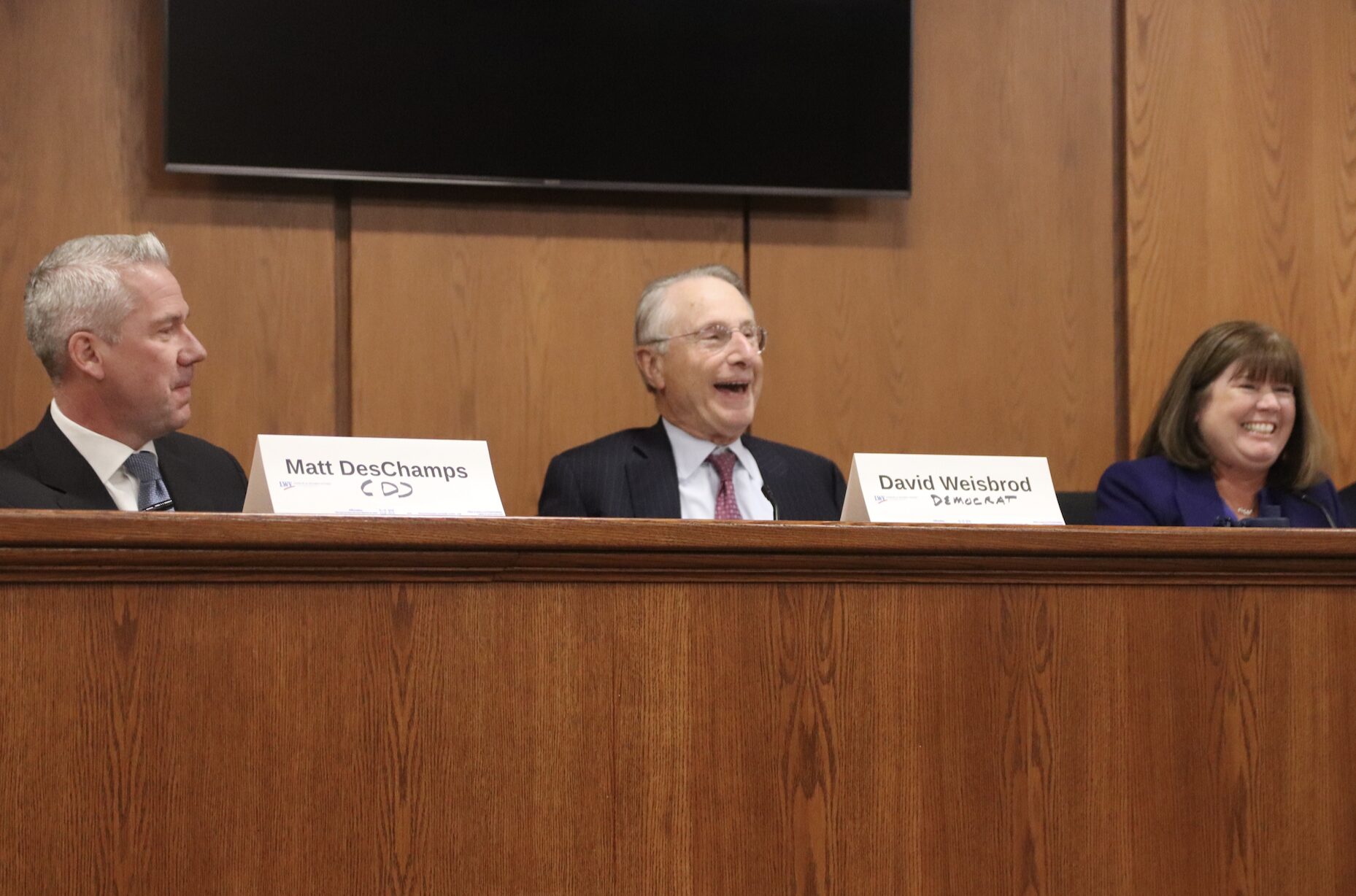
Matt DesChamps, David Weisbrod and Laura Erickson during the Oct 9 BET candidate debate hosted by the League of Women Voters Greenwich. Photo: Leslie Yager
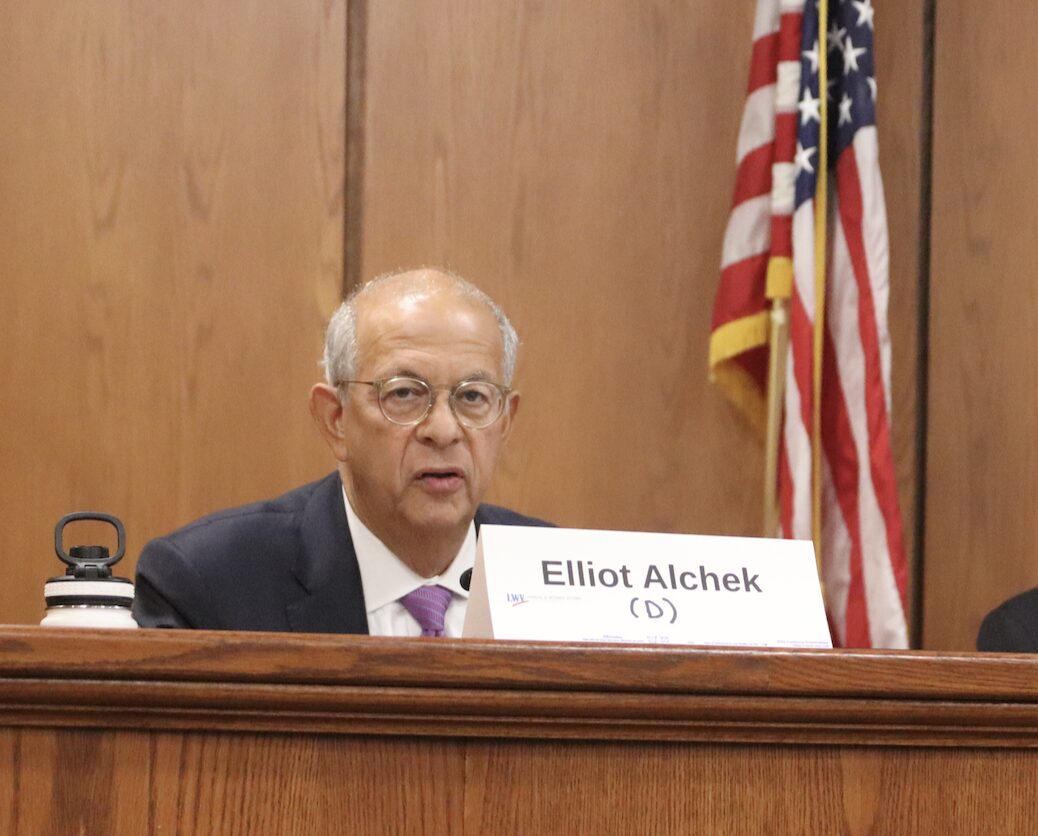
Elliot Alchek during the Oct 9 BET candidate debate hosted by the League of Women Voters Greenwich. Photo: Leslie Yager
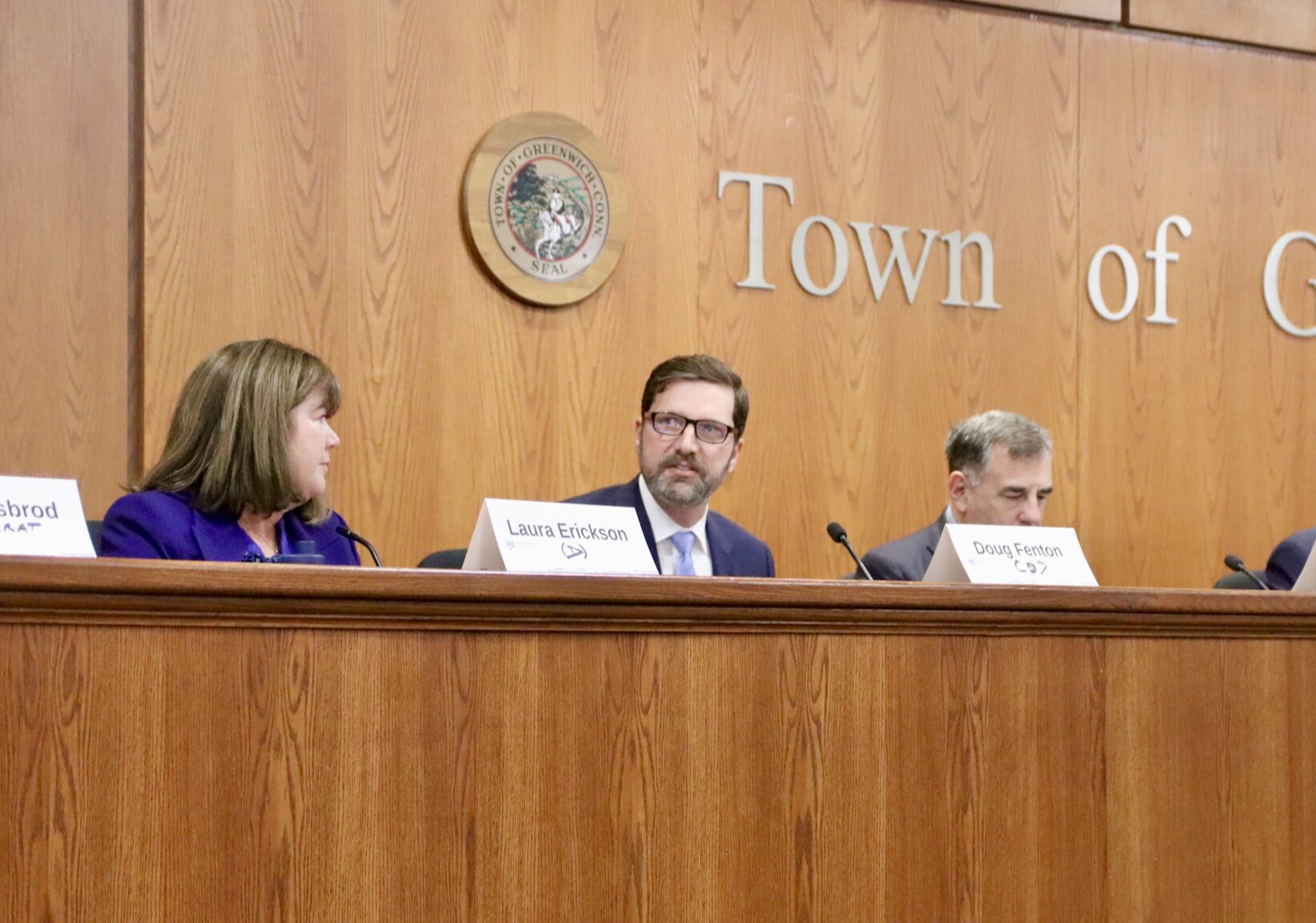
Laura Erickson and Doug Fenton during the Oct 9 BET candidate debate hosted by the League of Women Voters Greenwich. Photo: Leslie Yager
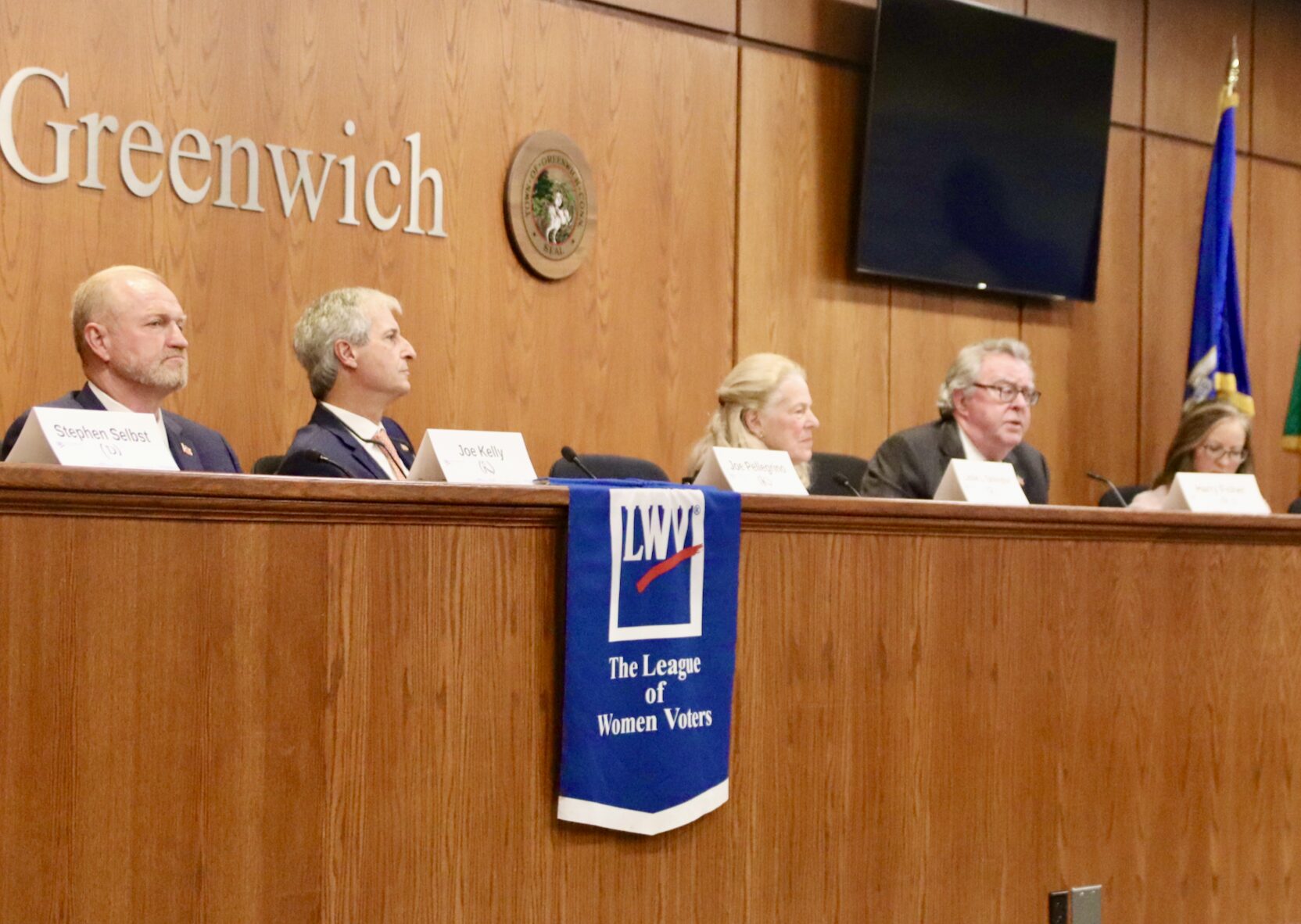
Republican candidates Joe Kelly, Joe Pellegrino, Leslie Tarkington, Harry Fisher, Sally Bednar during the Oct 9 BET candidate debate hosted by the League of Women Voters Greenwich. Photo: Leslie Yager
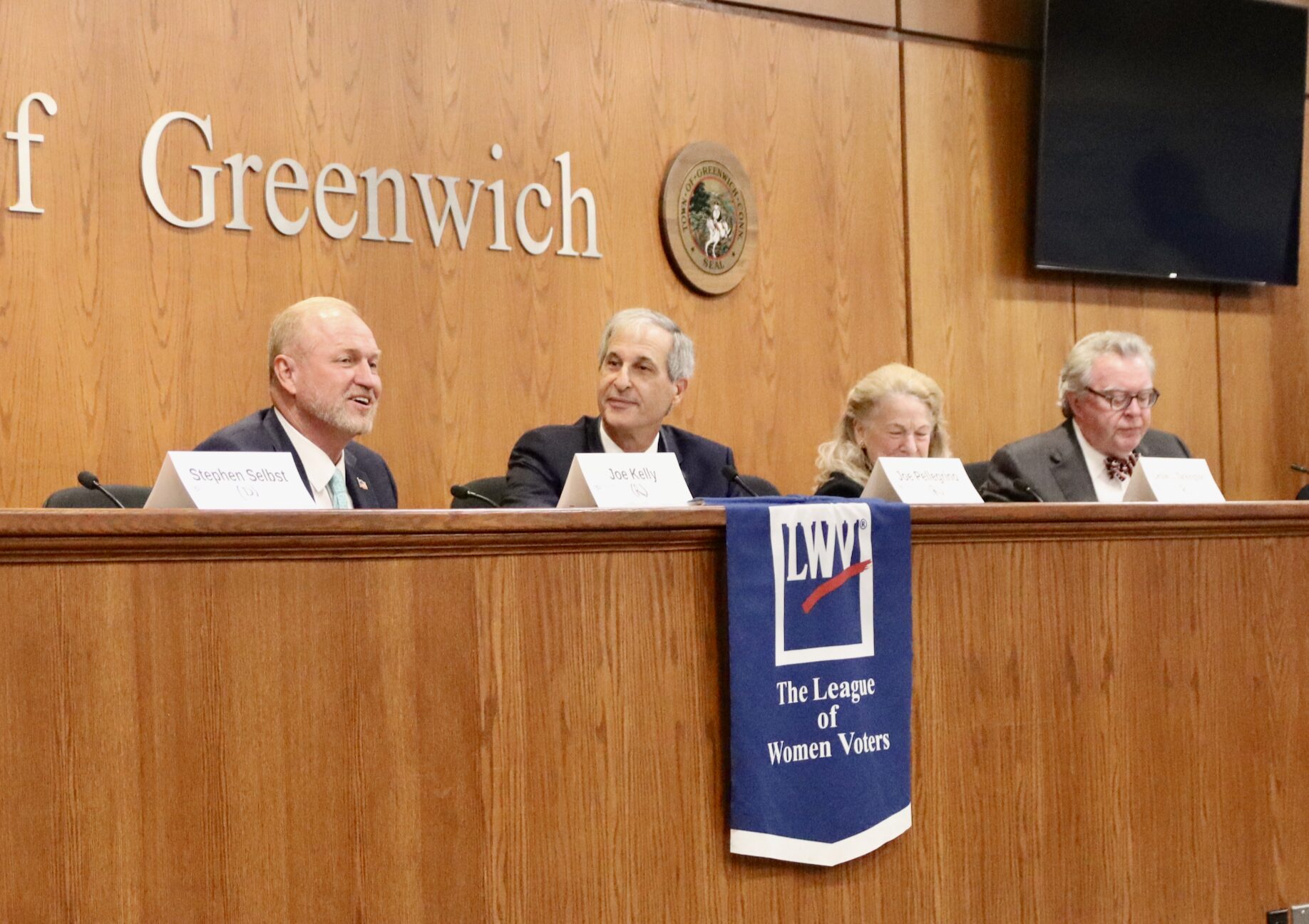
Republican candidates Joe Kelly, Joe Pellegrino, Leslie Tarkington and Harry Fisher during the Oct 9 BET candidate debate hosted by the League of Women Voters Greenwich. Photo: Leslie Yager
Democratic candidates hammered away at what they said was a lack of Republican collaboration, over-use of the Republican chair’s tie-breaking vote, and disregard for decisions and the will of the Representative Town Meeting and Board of Education.
Democrats said Republicans had failed to be transparent, citing last April’s last minute motion to cut $4 million from Greenwich Public School budget, which was passed with Mr. Fisher’s tie-breaking vote, which David Weisbrod described as Draconian.
Shortly after Weisbrod’s remark, Mr. Fisher announced there will be a public hearing in November.
“I’m going to announce the BET will have a public hearing about capital projects in November to open it up to more communication with the community,” Fisher said, adding that his slate had become “cohesive” during a “rough primary.”
The announcement of a hearing came as a surprise to the Democratic BET members.
Weisbrod said there had been over 24 tie-breaking votes in the last session.
“There is no communication. Even today, Harry is noting there is going to be a public hearing,” he said. “It’s all being discussed in a back room without transparency it needs.”
Democrats said Republican leadership had resulted in a backlog of infrastructure projects that resulted in Central Middle School being condemned and Old Greenwich School being decades overdue for ADA compliance, with sewage penetrating basement level classrooms after heavy rains.
Mr. Fisher said Democrats called for increasing issuance of debt when interest rates were low “in anticipation of projects.”
“That doesn’t work. You can’t issue debt unless you have an identified project, and we have a town that is overwhelmed with projects now,” he said. “The Democrats have a hard time at saying no to projects.”
Mr. Weisbrod recalled that the Republicans had voted no on the Central Middle School project three times.
“We don’t like to vote no on CMS,” he said. “And we didn’t vote no on Old Greenwich School because they have raw sewage coming into that school and we thought it was about time. Guilty as charged: We didn’t vote no on those projects.”
“Harry, you can’t say anything about the issuance of debt if you haven’t held a debt policy inter-session for four years. The BET requires it be called in every two years. It will be five years in December,” Weisbrod said, adding that while he would welcome new Republican members to the board, he believed it was time for Democratic leadership.
Fisher pushed back, saying the debt policy committee had not indicated they wanted to change debt policy.
“You don’t state what you change and then have the meeting,” said Democrat Matt DesChamps. “You have the meeting to discuss what you may want to change, and you do that after you’ve looked at the capital budget, which is not complete, not accurate, and is deleting many of the projects we need to look at as a town and figure out how we’ll pay for them and prioritize them.”
Mr. DesChamps said, for example, the project at Riverside School for $48 million had been deleted from the capital budget and $20 million for the Hamill Rink project had also disappeared from the capital budget.
“We talk about unfunded liabilities. We have unknown liabilities this town needs to pay for,” DesChamps added. “We delete projects we know we need. Not projects we want. And we delete them because we don’t like how big the numbers are.”
Ms Fassuliotis lamented what she described as drama and “mud-slinging” between parties on the board, and said her independence would break through the “echo chambers.”
“That’s why I’m running as an Independent,” she said. “Put community over politics and to steer our town back to what truly matters.”
Throughout the debate Fassuliotis said she would stand strongly against bullying, insults and misogyny.
Answering a question about the $4 million motion to reduce the school budget by $4+Million that resulted in busing changes, start time changes and staffing cuts, Josh Brown said, “I would not entirely be supportive of the $4 million on its own.”
“I believe that having honest, open discussion early in the process to understand the challenges and priorities in each of the departments, including the BOE,” he added. “I feel there was enough money in the budget.”
Democrat Doug Fenton who has a popular e-blast where he crunches school data, said the BET must be fact-driven.
“Josh said he ‘felt’ that the cut was right. That, to me that was the problem with the entire budget cut with the BET. There was an amazing amount of data out there.”
“These need to be data-driven decisions and we must understand what the services are, and the cost to deliver those,” Fenton said.
Further, he said, the BET had a full month to reopen the budget after the vote on the $4 million cut, but that did not happen.
“This put our town, our students and our kids in a very difficult situation that has led to negative consequences for folks with kids in school,” Fenton said. “I think it’s had an impact on our property values.”
Ms Fassuliotis said strong, well funded schools were critical. “But somehow schools have become super political with Republicans and Democrats in some kind of cage death match, and that false information and misinformation had spread like wildfire.”
Fassuliotis said Greenwich had the highest per pupil expenditure in the state.
“We’re now spending more than $28,000 per student, so the idea we’re cutting education is not true,” she continued, adding that school district operating budgets had increased 20% since she joined the BET, and experienced teachers are paid $133,000, which is more than any other municipality in the state.
She said enrollment had declined in GPS since the superintendent arrived five years earlier, but there had not been a cut based on enrollment.
Mr. Brown, who many know from his 32 years on the RTM, said the BOE had intentionally picked cuts that would make the community passionate and emotional.
“I would equate it to if you’re going to cut the Parks Department budget that they’re going to close Tod’s Point. It’s just going to get people riled up,” Brown said.
Democrat Laura Erickson, who previously served on both the BET and BOE, including a term as its chair, said, “It’s time for some truth-telling.”
“To all of the Republicans on the BET right now, including Ms Fassuliotis who is running as an Independent, but is currently a Republican on the BET: It was a cut. It was not a reduction in an increase.”
Ms Erickson said she was on the school board in 2017 when they decided to start Greenwich High School an hour later, at 8:30am, following months of public hearings and meetings.
“It was a significant, thoughtful policy change that has since been rolled back. It was rolled back because the BOE was trying to do everything it could not to impact the classroom,” she said. “They had very little time to make these decisions. It had the most economic impact and it did not affect the classroom.”
Erickson added that it was not fair to assume the schools budget should decrease based on enrollment declines, because she said that did not account for the significant increase in Pre-K enrollment (Pre-K is required is by law for special education students) and special needs students being placed in out-of-district schools.
“To have non-education professionals substitute their own judgement about what they think is best for our kids – that’s not the community I think we all want to live in,” Erickson said.
Mr. Fenton explained why education staff counts had not been reduced overall with a drop in enrollment.
“We’ve reduced our general education staff by 30 people in three years (almost 5%) and taken K-5 classrooms from 210 to 194,” he said. “We’ve had increased identification of special needs kids and unique learners. We need to provide support and services for those children. Also, we’ve had increased identification and need to deliver Pre-K.”
Mr. Fenton noted that each Pre-K classroom can potentially be staffed by one teacher plus two assistants.
Mr. Kelly, who like Ms Erickson, also previously served as BOE chair, said communication had been better between the BOE and the BET during his tenure, and that he would not have supported the $4 million reduction.
He said when he was on the BOE there was good communication that meant “there was no guessing what the answer is.”
“We worked on coming up with a number that made sense,” Kelly said. “Before it hit the press, before we had to do anything dramatic.”
Fassuliotis said the $4 million was not a cut.
“It was a reduction of a 5.1% increase to their budget and it came down to 3% with the reduction,” she said.
Republican Joe Pellegrino said, “I think our budget cycle is out of whack. I think we should have budget guidelines no later than the second week of July. We should be in those guidelines with the BOE as they develop their budget starting in August/September.”
“You can’t have a budget cycle like we have now where you’re going after the school budget in the 11th hour and throwing them into disruption,” Pellegrino added.
Democrat Stephen Selbst said, “We heard about the $4 million cut for the first time on decision day. What you’re really seeing – and the four new Republican members – recognize their team made a gargantuan mistake that cost the community.”
“We have a choice here. That’s not how we would have done it,” he said. “That is how they did it. They owned their record. And while I encourage them to work with us in the future, those are the facts, and that is why the voters ought to elect BET Democrats and give us a chance to demonstrate how we would run the BET.”
Selbst said the job of the BET was to ascertain the will of the community and then find a way to finance it and make it happen.
“In the past couple of terms is this body has chosen to act as a super legislature and start imposing policy decisions contrary to the will of the community,” Selbst said, using the HVAC system at Ham Ave School as an example.
“This board said we don’t want to fund that (geothermal system) and sent it back to the BOE and the RTM. Then both bodies said, ‘This is the way we want to go.'”
“We shouldn’t impose policy preferences,” Selbst said. “I’m disappointed we’ve had some mission creep.”
Mr. Weisbrod agreed, recalling that when the leaf blower ordinance was passed by the RTM, Republicans on the BET rejected that mandate.
Mr. DesChamps said in recent years the budget guidelines had been created by the budget committee after the BOE created its budget, and after the departments put together their budgets, which was too late.
“Those guidelines should be clear and concise, published and available the public and to the town departments,” he said.
Leslie Tarkington lamented the days of collaboration between the BOE and BET in the past.
She was critical of the Board of Education.
“The BOE is by far more than half of our budget,” she said. “What’s changed since I’ve been on the BET is the governance of the Board of Education. It used to be much more coordinated with the Town. We’d talk more about the budget. They’d come frequently to town hall. the Superintendent, the BOE chair would come to those meetings monthly and contribute. Dialogue is two way.”
“Just the way civility is also two-way. Town voters also have to be civil to use. What’s changed is they think they’re governed by the State, and there is much more independence. It’s not worked as well. This last term has created turmoil.”
Democrat Elliot Alchek said it was down to the BET to do a better job communicating with other town bodies.
“Frankly, we can’t do worse,” he said. “It was really embarrassing last year….Our Republican colleagues have to do a better job, not just talking about it, but actually doing it. The answer is not throwing a $4million budget cut amendment during the budget days. The answer is if we want to cut the budget, do that months in advance, not minutes in advance.”
Ms Erickson said it was “astonishing” to hear blame being placed on the Board of Education.
“This year we all heard about the $4million budget cut that was dropped like the nuclear option on decision day. No one knew about it in advance,” she said. “The BOE had to quickly pivot and figure out how to implement that in a matter of weeks before the fiscal year started.”
“There has to be respect on both sides. It astonishing to hear the blame is with the BOE.”
Mr. Weisbrod agreed the Republican-led BET had disregarded other government bodies.
“When the RTM voted overwhelmingly, pleading with this body, to reconsider the draconian $4 million cut and the Republican First Selectman also supported a look back at that $4 million cut, this body thumbed its nose.”
Citing another example, Weisbrod said, “When public spirited people were able to get funding from the state for an innovative food scrap program, this body tormented them.”
“The notion that there is one group that is fiscally responsible and preaching to the rest of us about – that is a bit offensive,” he added.
“For the 2 years that Democrats did have the majority vote, our record in terms of mill rate increases were lower than the Republicans have been. The first year: zero percent increase. The next year: a little more than 2 percent,” Weisbrod said. “We won’t be preached to about fiscal responsibility, our track records, our resumes. Our experience speaks for itself.”
Ms Tarkington responded to Mr. Weisbrod’s comments, referring to decisions made by other bodies as “unfunded liabilities,” some created by the state legislature and others by the RTM.
Mr. Pellegrino said the Republicans were poised to have excellent relationships with the other government bodies.
“We will work assiduously to make sure the Republicans stand up and are responsible to the taxpayers in terms of making the town work at the highest level of services at the lowest cost to their pocketbook.”
Mr. Weisbrod shared some suggestions for cost savings to the town.
He talked about “eliminating silos” that exist where departments don’t share resources as much as they could.
Some specific ideas included creating a website for permitting to make that process easier, removing cash from the system, setting up one central call center similar to the one in Norwalk (311), setting up a purchasing card using ACH (Automated Clearing House) throughout the system, and adopting the Tyler Technologies vendor management program to make the vendor process more efficient.
“There are many ways to work together to reduce expenses that won’t have draconian impact but will make the town more efficient in how we deliver the services everybody wants,” Weisbrod said.
Mr. Fisher, the current BET chair, said the Republican team would better serve the town than one that “also dominates the state government that imposes itself on our finances and freedoms.”
Elliot Alchek said, “The last minute $4million cut to the school budget, Republican shouting matches at BET committee meetings, and the waste caused by delayed projects like the civic center aren’t normal.”
Mr. Alchek said he previously ran the municipal bond desk at Goldman Sachs where he started his career, and had worked with municipalities around the country that were AAA rated, as well as ones that were in default.
“The use of long term debt and structure for the terms of the debt depend on the circumstances,” he said. “We’re talking about financing a specific asset like a school or sewer system that will be around for 50 years, maybe long term debt is appropriate.”
“The first thing you should know is we live in a bubble here: Our debt policy of pay-as-you-go is not normal. Virtually every municipality in the US issues long term debt to finance their schools. We don’t. I get it, some people don’t want to issue debt because they don’t want to spend the money in the first place. That’s okay, just be honest about it,” Alchek said.
Mr. Weisbrod described the current BET as broken.
“To keep taxes low and predictable, we need new leadership,” he said. “My Democratic colleagues have illustrious finance and legal backgrounds – Morgan Stanley, JP Morgan, Goldman Sachs, Herrick, Feinstein Law Firm – we got that. We know how to do multi-year capital plans and we’re committed to restoring collaborative, bi-partisan work. We’re committed to a low and predictable mill rate.”
Weisbrod said he was formerly vice chairman of JP Morgan, the culmination of a long career.
Republican Joe Kelly said he too had bond experience and was eager to bring his high energy to the board. He listed several boards, businesses and sports teams he had coached including the GHS rugby team, and said he typically makes 250 to 300 phone calls a day.
“Bonds can help us in some of our projects, but bonds are still borrowing money to buy something today and pay for it in the future. If we’re extending the length of those bonds, pushing the bonds into a longer duration, we’re giving that debt over to my children to pay for.”
“There is a trade-off if we create long term debt. It’s that we have control of that premium that is realized in our real estate right now, because we don’t borrow as much as some other towns.”
Sally Bednar said she also worked almost 30 years in the bond business, mostly in municipal bonds.
“We have a AAA credit rating. We are one notch higher than the US government in credit rating. When an investor buys our bonds that Triple A credit rating impacts the borrowing rate.”
Ms Bednar said, “Greenwich is in a win-win situation. Let’s not screw it up. The fiscal priorities we debated are the good kind of challenges to have because they are solvable.”
“Greenwich has won,” Bednar said. “The only contest is who here is better to do the job for you and run the BET.”
Mr. Selbst said he too had bond experience – specifically 45 years mostly in the corporate world. “I know what happens when things go wrong. You learn to make tough financial decisions.”
Mr. Kelly talked about the BET chair’s tie-breaking vote, saying, “This group is a strong old-time Greenwich Republican group, deserving of the tie breaking-vote, which I don’t think we’re ever going to use.”
Mr. Brown said the BET was organized to intentionally stir conversation and collaboration.
He said in his 32 years on the RTM he had worked with many BET boards and recalled the tie-breaking vote was rarely used.
“Only in the past couple years has that been cast aside, he said. “We will roll up our sleeves in a constructive, collegial way to find the resolution without having to use that 7th vote.”
Mr. Fenton said the best town government was one that residents didn’t have to think about.
“It should deliver excellent services while respecting that tax dollars are a scarce resource,” he said.
“If they overrule the recommendations of other elected bodies then debate it publicly,” he added. “From my seat on the BOC I have witnessed first-hand how the current BET lack the data driven rigor that all residents should expect.”
See also:
Oct 9, 2025
Board of Education Debate Heats up Over Public Schools Budget
Oct 7, 2025
Selectmen Debate, Not So Contentious; More Like a Slow Boil
Sept 30, 2025